 Welcome to Issue 55 of the SUPERIOR BOOK PRODUCTIONS newsletter!
Welcome to Issue 55 of the SUPERIOR BOOK PRODUCTIONS newsletter!
Happy October and Happy Halloween!
As a long-time fan of the Gothic, who grew up playing haunted house and always being Dracula and who refused to dust his room because he wanted cobwebs like in a haunted house, it’s not a surprise that this is one of my favorite times of year.
 It’s the perfect time to plug my book The Gothic Wanderer, which discusses all those great horror novels like Dracula and Frankenstein as well as some novels that might surprise you as Gothic like A Tale of Two Cities and some must-reads you may have never heard of like Varney the Vampyre and The Mysteries of Udolpho (Jane Austen read it—see quote below).
It’s the perfect time to plug my book The Gothic Wanderer, which discusses all those great horror novels like Dracula and Frankenstein as well as some novels that might surprise you as Gothic like A Tale of Two Cities and some must-reads you may have never heard of like Varney the Vampyre and The Mysteries of Udolpho (Jane Austen read it—see quote below).
But if scary stories aren’t your thing, there are plenty of other great books listed in this month’s newsletter from a book about Disneyland to a Civil War novel and books on leadership, spirituality, and personal development—as always, something for everyone.
Watch out for the vampires and werewolves since I hope you’ll be around for my next newsletter in November.
Tyler
This Month’s Great Book Quote:
“Dear creature! how much I am obliged to you; and when you have finished Udolpho, we will read The Italian together; and I have made out a list of ten or twelve more of the same kind for you.”
“Have you, indeed! How glad I am!—What are they all?”
“I will read you their names directly; here they are, in my pocket-book. Castle of Wolfenbach, Clermont, Mysterious Warnings, Necromancer of the Black Forest, Midnight Bell, Orphan of the Rhine, and Horrid Mysteries. Those will last us some time.”
“Yes, pretty well; but are they all horrid, are you sure they are all horrid?”
“Yes, quite sure; for a particular friend of mine, a Miss Andrews, a sweet girl, one of the sweetest creatures in the world, has read every one of them....”
— Jane Austen, Northanger Abbey (1818)
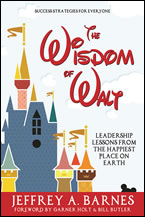 When Jeff Barnes came up with the idea of teaching a “History of Disneyland” class, he was afraid his colleagues would laugh and never let him teach what they would perceive as a “Mickey Mouse” course, but he went through with the idea anyway, and teaching at a university in Southern California, not far from Disneyland, meant he soon had plenty of students who were not only interested but enthusiastic.
When Jeff Barnes came up with the idea of teaching a “History of Disneyland” class, he was afraid his colleagues would laugh and never let him teach what they would perceive as a “Mickey Mouse” course, but he went through with the idea anyway, and teaching at a university in Southern California, not far from Disneyland, meant he soon had plenty of students who were not only interested but enthusiastic.
What is so fascinating and educational about the history of Disneyland? More than you could ever imagine, and enough that Dr. Barnes has now written an entire book on the subject, but it’s not just a history book—The Wisdom of Walt: Leadership Lessons from the Happiest Place on Earth presents Walt Disney’s vision and development of Disneyland as a source of inspiration for all of us in our own pursuit of our dreams and life purposes. Each story of Disneyland that Dr. Barnes shares contains a lesson in it to help us become better visionaries, overcome our obstacles, and lead ourselves and others toward success.
To read more, visit The Wisdom of Walt.
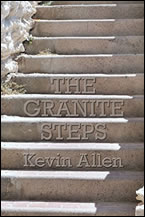 The Granite Steps is a short book, but one big on wisdom. Best of all, it is an enticing parable about a young boy without a father who is trying to make some extra money selling newspapers to help his mother and sisters. Kempton has the desire to succeed, but he doesn’t have the know-how. Fortunately, one day he meets a man, Sir Granite, who takes him under his wing and guides him. Sir Granite doesn’t seem to do much except sit around the park all day, but Kempton soon learns his new friend has a fascinating past, having had many adventures and even having been knighted by a queen; in his travels, Sir Granite has also gained a lot of wisdom and advice to offer Kempton.
The Granite Steps is a short book, but one big on wisdom. Best of all, it is an enticing parable about a young boy without a father who is trying to make some extra money selling newspapers to help his mother and sisters. Kempton has the desire to succeed, but he doesn’t have the know-how. Fortunately, one day he meets a man, Sir Granite, who takes him under his wing and guides him. Sir Granite doesn’t seem to do much except sit around the park all day, but Kempton soon learns his new friend has a fascinating past, having had many adventures and even having been knighted by a queen; in his travels, Sir Granite has also gained a lot of wisdom and advice to offer Kempton.
The book’s title refers to the wisdom Sir Granite imparts to Kempton. The advice begins with tips on salesmanship that help Kempton become the best paperboy at the newspaper. From there, Sir Granite guides Kempton in his career choices as he outgrows selling papers and begins thinking about his career.
To read more, visit The Granite Steps.
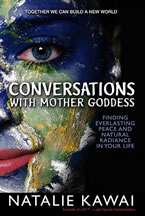 Prepare yourself for an extraordinary and life-changing journey when you read Natalie Kawai’s new book Conversations with Mother Goddess. Most of us probably didn’t even know the Mother Goddess could speak, if we even knew she existed. Some of us will also be skeptical about Natalie’s ability to talk with her, but before you become judgmental, try to listen thoughtfully and allow Natalie and the Mother Goddess’ powerful words to sink into your heart and find a home. You can decide for yourself after you know what she has to say.
Prepare yourself for an extraordinary and life-changing journey when you read Natalie Kawai’s new book Conversations with Mother Goddess. Most of us probably didn’t even know the Mother Goddess could speak, if we even knew she existed. Some of us will also be skeptical about Natalie’s ability to talk with her, but before you become judgmental, try to listen thoughtfully and allow Natalie and the Mother Goddess’ powerful words to sink into your heart and find a home. You can decide for yourself after you know what she has to say.
The book’s subtitle suggests that by reading this book and incorporating its philosophy into your life, you can find everlasting peace and natural radiance. I do believe you will find that because while Kawai builds on ideas often found in spiritual and self-help books, from discussing the ego to positive thinking, she also offers a revolutionary new understanding about such topics as the concept of God and where modern positive thinking has gone wrong.
To read more, visit Conversations with Mother Goddess.
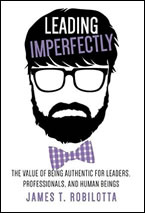 James Robilotta has held a variety of roles in his life from student leader to student affairs professional to stand-up comedian, public speaker, and personal life coach. Those experiences have given him the opportunity to lead, be led, and help develop new leaders, which ultimately led him to a powerful realization: “I see a problem in today’s developing leaders—they think they need to be someone they are not to get what they want. This mentality negatively impacts the way they communicate and build relationships with their peers, coworkers, and supervisors.”
James Robilotta has held a variety of roles in his life from student leader to student affairs professional to stand-up comedian, public speaker, and personal life coach. Those experiences have given him the opportunity to lead, be led, and help develop new leaders, which ultimately led him to a powerful realization: “I see a problem in today’s developing leaders—they think they need to be someone they are not to get what they want. This mentality negatively impacts the way they communicate and build relationships with their peers, coworkers, and supervisors.”
James can see this fault because it’s one he’s admittedly had himself; for example, in high school he took on multiple leadership roles not because he was committed to being a leader but because of how it would look on his resume, and in college, he tried to dress well to fit in with popular ideas of what it meant to be “fresh.” Fortunately, James became aware of these faults and changed, as well as learned to laugh at himself....
To read more, visit Leading Imperfectly.
 Expanding Your Heart: Four Stages of a Spiritual Opening takes readers on a personal journey of enlightenment to find meaning and strength in the painful and chaotic moments of their lives.
Expanding Your Heart: Four Stages of a Spiritual Opening takes readers on a personal journey of enlightenment to find meaning and strength in the painful and chaotic moments of their lives.
The four stages of what Wendy terms a “Spiritual Opening”—an experience in which we become more open to our own spirituality and our connection to the Universe and God—are: the Initial Heart Opening, Chaos, Healing, and Contemplative Being. While Wendy defines these stages in detail in the book, I’ll just say here that these are not rigidly separate stages, but they can overlap with one another. A Heart Opening can feel like a breakdown, but it’s actually a revelation in which truths are revealed. Chaos may happen in the wake of the Initial Heart Opening; it results when what previously supported you before your Initial Heart Opening begins to fall away and you find yourself turning inward to draw on your internal strength. Healing occurs when you choose to move past the Chaos by taking responsibility for your life. Finally, you arrive at Contemplative Being....
To read more, visit Expanding Your Heart.
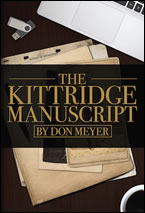 Don Meyer’s new book The Kittridge Manuscript exceeds expectations. Since I had previously read his award-winning novel The American War, which blended the Civil and Vietnam Wars into one story, I knew I could expect a similar treatment of both wars in this novel, but that book was very focused on battle descriptions and depictions of the soldiers’ lives, while The Kittridge Manuscript is less about war than about a mystery that concerns some Vietnam soldiers some forty years after their tours of duty and a manuscript dating back to the Civil War that one of those former soldiers possesses.
Don Meyer’s new book The Kittridge Manuscript exceeds expectations. Since I had previously read his award-winning novel The American War, which blended the Civil and Vietnam Wars into one story, I knew I could expect a similar treatment of both wars in this novel, but that book was very focused on battle descriptions and depictions of the soldiers’ lives, while The Kittridge Manuscript is less about war than about a mystery that concerns some Vietnam soldiers some forty years after their tours of duty and a manuscript dating back to the Civil War that one of those former soldiers possesses.
Far from being a whodunit, The Kittridge Manuscript is more like a John Grisham lawyer thriller, only the lawyer represents a former Vietnam soldier who possesses a Civil War manuscript with a history-changing revelation. Throw in a sexy fifty-eight-year-old college professor and you have a historical mystery reminiscent of A.S. Byatt’s Possession, where the characters discover Victorian manuscripts that shed light on the present, and The Da Vinci Code, where old secrets are revealed that are both shocking and fascinating.
To read more, visit The Kittridge Manuscript.

